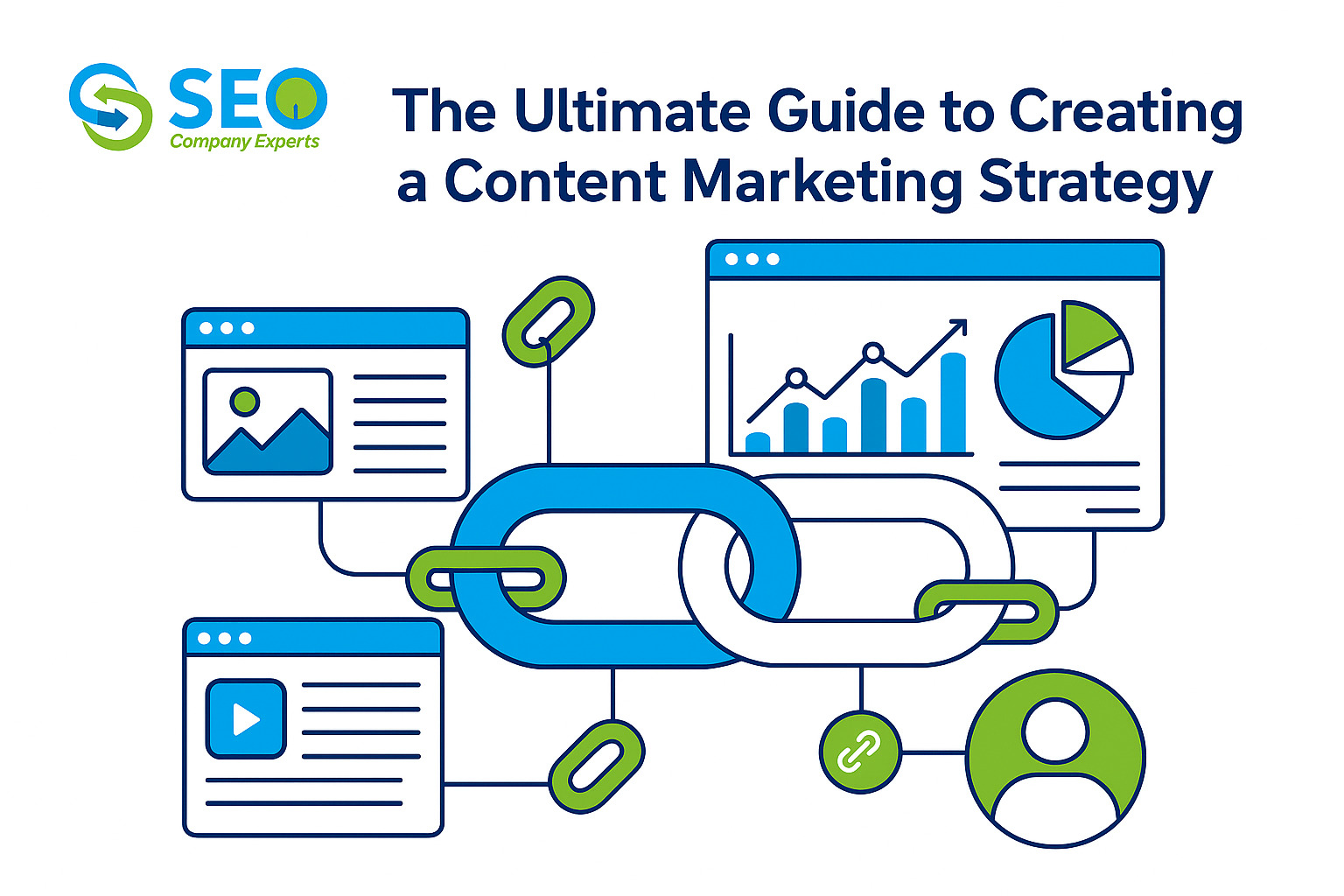

In today’s digital-first world, brands are no longer defined only by their products or services. Instead, they are shaped by the stories they tell, the value they share, and the trust they build with their audiences. That’s where content marketing strategy comes into play. Businesses that create structured, audience-focused content plans not only capture attention but also drive meaningful engagement and long-term growth.
This blog serves as the ultimate content marketing guide for marketers, entrepreneurs, and business owners. You’ll learn how to build a well-rounded strategy, understand its connection with your overall digital marketing strategy, and gain actionable steps for creating a content marketing strategy that truly works in 2025 and beyond.
What is a Content Marketing Strategy?
A content marketing strategy is more than just creating blog posts or social media updates. It’s a carefully crafted plan that outlines:
- Who your audience is
- What type of content they value
- How and where to deliver that content
- How to measure success
Instead of chasing clicks or short-term traffic spikes, a content strategy is about aligning content with business goals. Done correctly, it positions your brand as a reliable authority while driving measurable results like higher conversions, stronger SEO rankings, and deeper brand loyalty.
According to a Content Marketing Institute report, businesses with a documented content strategy are significantly more likely to see success compared to those that rely on ad hoc publishing.
Why Content Marketing is Essential in a Digital Marketing Strategy
Content marketing is the backbone of a strong digital marketing strategy, helping businesses build trust, engage audiences, and drive long-term growth. It ensures your brand message reaches the right people at the right time.
1. Builds Trust and Authority
Consumers today don’t just buy a product they research, compare, and evaluate before making decisions. High-quality, valuable content builds trust and establishes your brand as an authority in its field.
2. Enhances SEO and Visibility
Google prioritizes content that demonstrates expertise and value. A strong content marketing guide ensures your website attracts organic traffic by aligning with user intent.
3. Supports Lead Generation
Well-crafted content whether it’s a blog, eBook, or video serves as a lead magnet. By offering value upfront, you can convert visitors into subscribers and then into paying customers.
4. Strengthens Customer Relationships
Content nurtures existing customers, ensuring they stay engaged with your brand. From newsletters to personalized recommendations, consistent content creates long-term loyalty.
5. Works Across Multiple Channels
A single piece of content can be repurposed across blogs, social media, email campaigns, and paid ads, maximizing impact and efficiency.
The Core Elements of a Content Marketing Strategy
A successful strategy isn’t built overnight. It requires careful planning, execution, and refinement. Below are the foundational elements:
1. Define Your Goals
Why are we creating content?
- To increase brand awareness?
- To generate leads?
- To drive sales?
- To improve customer retention?
Clear goals ensure that every piece of content serves a purpose within your broader digital marketing strategy.
2. Identify Your Target Audience
Effective content resonates only if it’s tailored to the right audience. Conduct audience research by examining demographics, pain points, motivations, and online behaviors.
Create buyer personas that represent your ideal customers.
- Persona 1: Sarah, 32, Marketing Manager, looking for social media solutions.
- Persona 2: Raj, 45, Small Business Owner, seeking affordable digital marketing strategies.
3. Conduct a Content Audit
Before creating new content, evaluate what you already have.
- High-performing content that can be repurposed
- Outdated posts that need refreshing
- Gaps in topics that your audience cares about
4. Choose Content Types
Different audiences prefer different formats. Common options include:
- Blogs and articles
- Infographics
- Case studies
- Podcasts
- Videos
- E-books and guides
5. Develop a Content Calendar
Consistency is key. A content calendar ensures timely publishing, keeps your team organized, and maintains a steady flow of fresh content.
6. Optimize for SEO
Your content marketing strategy should integrate SEO best practices:
- Keyword research aligned with search intent
- Proper on-page optimization (headings, meta descriptions, alt text)
- Internal and external linking
- Mobile-friendly formatting
7. Distribute Across Channels
Publishing on your website alone is not enough. Share and promote your content across:
- Social media platforms
- Email marketing
- Guest posting
- Partnerships and collaborations
8. Measure and Refine
Key performance indicators (KPIs) like website traffic, engagement rate, conversion rate, and ROI help evaluate success. Use analytics tools to track performance and adjust your strategy.
Step-by-Step Guide to Creating a Content Marketing Strategy
A strong content marketing strategy is the backbone of online growth. This step-by-step guide will help you plan, create, and execute a strategy that drives real results.
Research Your Market and Audience
Use surveys, customer interviews, and analytics tools to identify customer needs. The deeper you understand their motivations, the more relevant your content becomes.
Map Content to the Buyer’s Journey
Not all content serves the same purpose.
- Awareness stage: Blog posts, infographics
- Consideration stage: Case studies, comparison guides
- Decision stage: Testimonials, product demos
Create High-Quality Content
Quality always beats quantity.
- Original insights
- Storytelling that connects emotionally
- Practical tips and solutions
Leverage Technology
Tools like SEMrush, HubSpot, or Trello help streamline keyword research, performance tracking, and content scheduling.
Repurpose Content
Turn blogs into infographics, podcasts into social posts, and webinars into video snippets. This ensures wider reach with less effort.
Encourage Engagement
Add CTAs, ask questions, and create interactive formats to spark conversation.
Monitor Competitors
Study how competitors approach content. Identify gaps where you can offer more value or a unique perspective.
Best Practices for a Sustainable Content Marketing Strategy
- Consistency over intensity: Publish regularly instead of sporadically.
- Prioritize value: Always focus on solving audience problems.
- Humanize your brand: Use relatable stories, real examples, and authentic voices.
- Balance evergreen and trending content: Evergreen posts bring long-term traffic, while trending topics capture immediate attention.
- Integrate with paid campaigns: Boosting strong content through ads extends reach.
Common Mistakes to Avoid in Content Marketing
Even with the best intentions, businesses often fall into traps:
- Focusing only on sales instead of providing value.
- Keyword stuffing that ruins readability.
- Ignoring analytics, leaving strategy stagnant.
- Publishing inconsistently, which weakens trust.
- Overcomplicating content, instead of keeping it clear and actionable.
The Future of Content Marketing Strategy
As technology evolves, so does content marketing. Emerging trends include:
- AI-powered personalization
- Voice search optimization
- Interactive and immersive content
- Greater emphasis on storytelling over direct advertising
- Data-driven content creation
Businesses that embrace these changes will stay ahead in their industries.
Conclusion
A strong content marketing strategy is the backbone of a successful digital marketing strategy. From audience research to content distribution and analysis, every step plays a vital role in achieving business goals. By using this content marketing guide, you can start creating a content marketing strategy that drives visibility, engagement, and growth.
If you’re ready to elevate your marketing game, partnering with experts makes all the difference. For tailored strategies and measurable results, trust SEO Company Experts to guide your journey.





